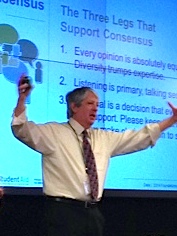When we teachers, parents, managers, leaders, and others with more apparent power see ourselves as in control of others, we encourage childishness―in others and in ourselves. This is especially true in the workplace, where we struggle with the boundaries of control and often mistake a lack of questions for agreement. That void of questions is often a reflection of childish behavior.
Three symptoms of childishness:
- False passivity (agreeing in order to avoid being corrected)
- The body language of disengagement (including tardiness, texting and checking e-mail during meetings, and deadly eye-rolls with tsks)
- Fighting meaningless battles (pushing back over trivialities and perpetuating endless, pointless conversations about important issues that never resolve)
If you have small children or were one, you have experienced childlike behavior: wonder, curiosity, fearless exploration, discovery, concrete learning (physical involvement through movement and hands-on creativity, even if only writing on a flip chart). Note: Does not include sitting around, talking.
The good news: All human beings have an innate desire to generate and explore possibilities. When we see ourselves and those around us acting childishly, it's time to take a break, look in a mirror, and ask, "Where's the tiger?" By that I mean, we tend to inappropriately impose control as well as act out when we're afraid. Managers and teachers can ask themselves: Am I afraid of losing the illusion of control or of an actual threat?
When people are acting childishly, at least part of the cause is that they're being treated childishly. They're feeding into our expectations. When we act childishly, we are disregarding trust in the innate ability abilities of ourselves and others.
Over time, we can entertain more ambiguity. We can relax our natural but flawed need for the illusion of control. When we do this artfully, we and those around us will move toward childlike engagement: energetic, focused, playful. In other words, productive. After all, every game involves critical thinking and problem solving. When we see ourselves in control of others, we encourage childish behaviors. Childlike moves toward engagement. Childish moves toward withdrawal.






